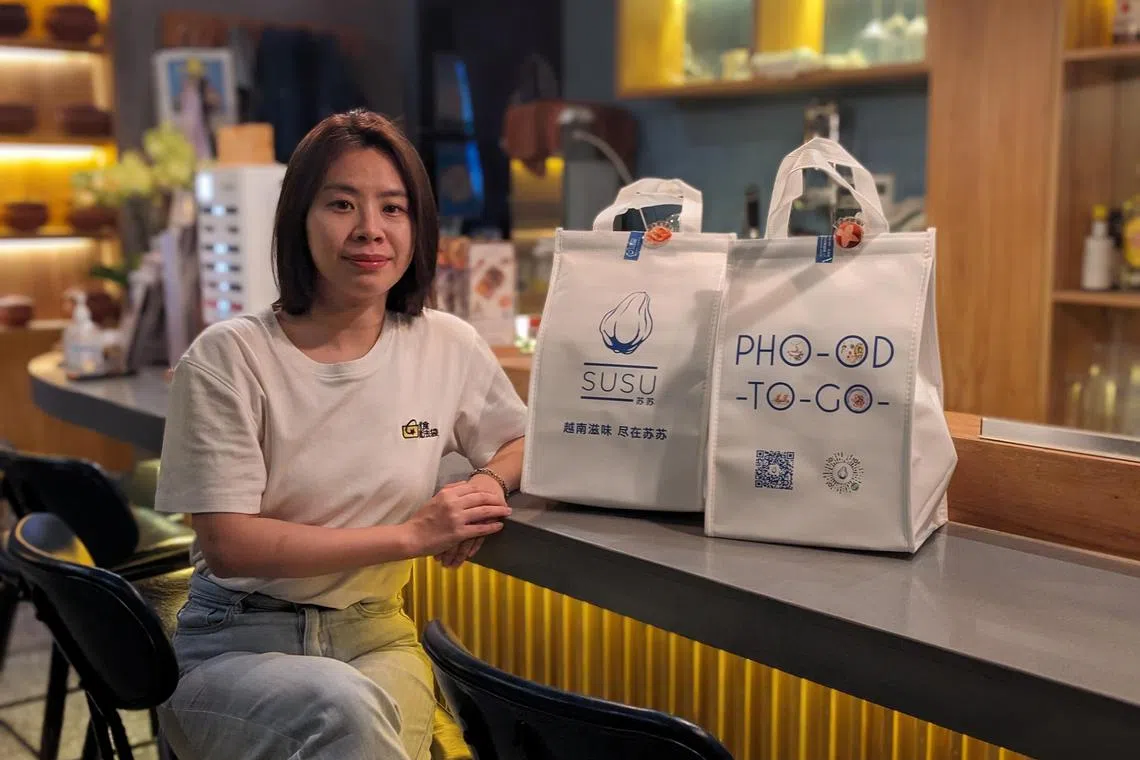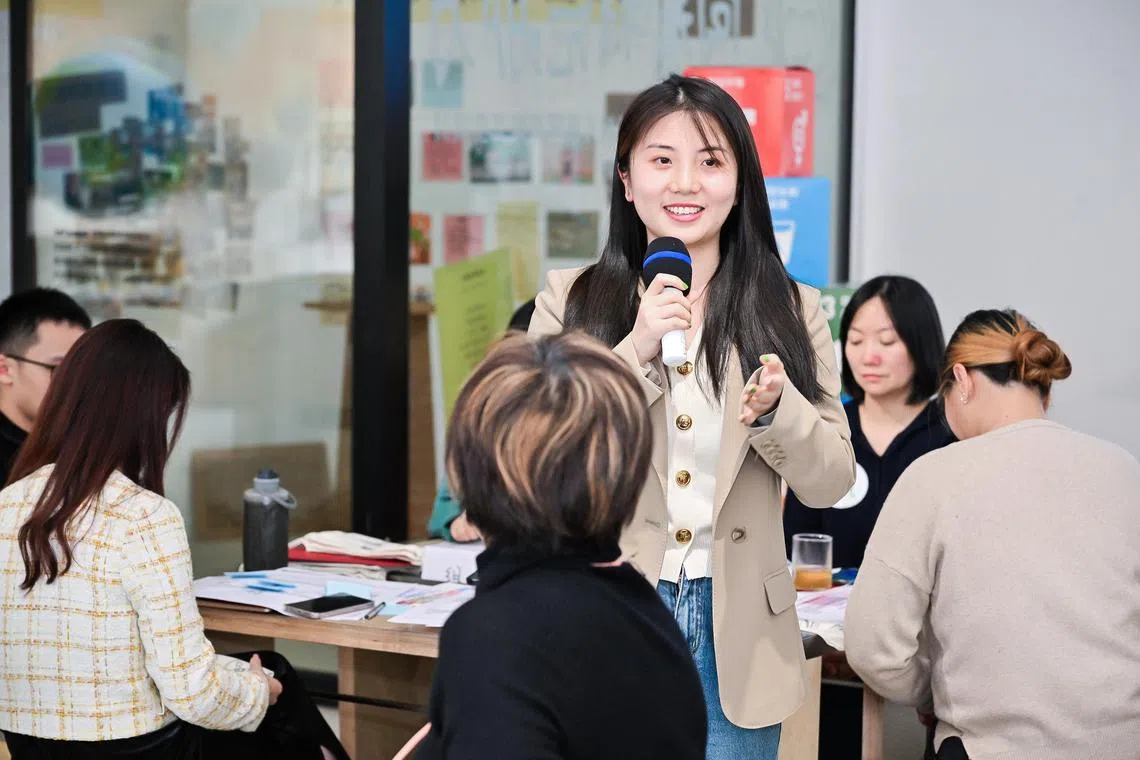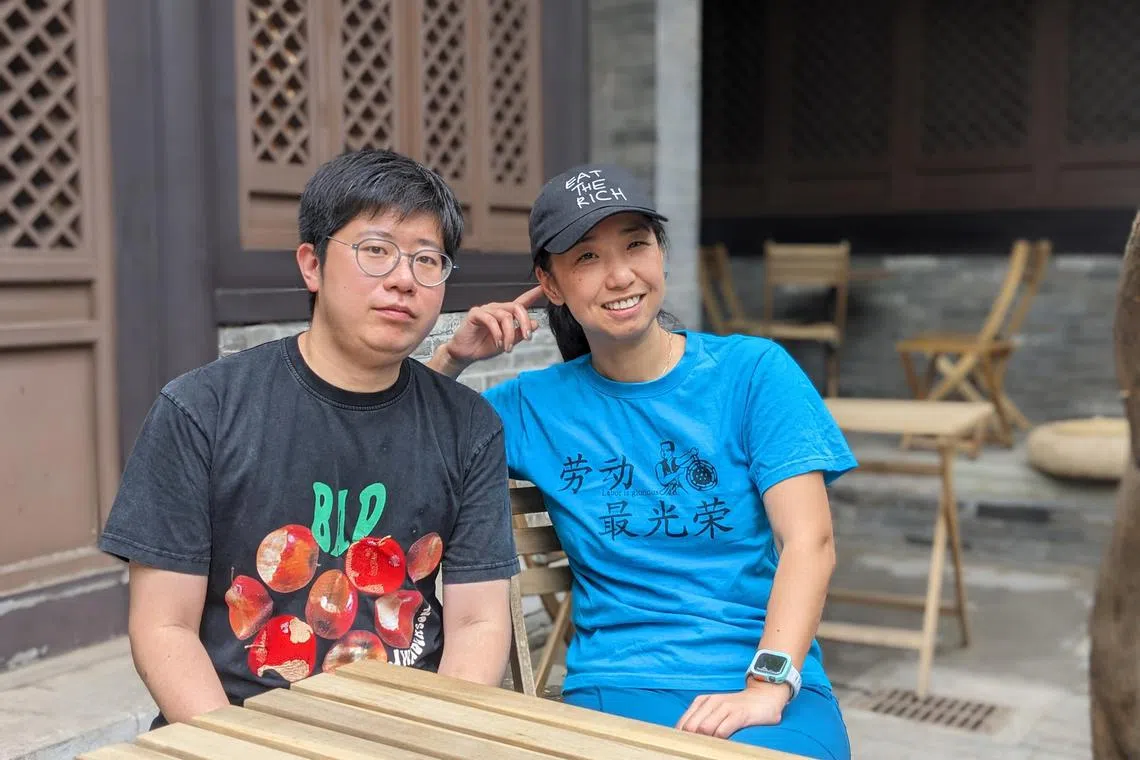Brewing beer from bread: Beijing’s youth take charge to inspire change, help climate efforts
Sign up now: Get ST's newsletters delivered to your inbox

Ms Luona Cai is a partner at Xishi Magic Bag, a start-up that allows consumers to buy and pick up unsold food from blind boxes near the restaurants’ closing time.
ST PHOTO: GOH YAN HAN
Follow topic:
BEIJING – The youth of China’s capital city are at the forefront of green initiatives to inspire social change, plugging a glaring gap in the country’s environmental efforts.
These efforts include starting online platforms to help push their fellow citizens towards a more eco-friendly lifestyle and creating companies that help eateries turn unsold food into beverages or blind boxes for consumers looking for a bargain.
These young men and women want to make people aware that everyone can help fight climate change in China, the world’s top energy consumer and largest greenhouse gas emitter, entrepreneurs told The Straits Times.
“The China market is so big and there are different awareness levels, so it takes time to slowly change mindsets,” said Ms Luona Cai, 31, a partner at Xishi Magic Bag, a start-up that allows consumers to buy and pick up unsold food from blind boxes near the restaurants’ closing time.
The people purchasing their meal via an app do not know what is in the box before pickup; it depends on what the shop could not sell on that day. The service is available in some 60 cities, including Beijing, Shanghai and Suzhou.
Meanwhile, Beijing-based firm Louder picks up leftover bread from bakeries and turns it into beverages, including beer.
Another organisation, GreenGeek, which was started by Beijing undergraduate Zhang Yu, empowers other young people to start their own eco-initiatives to educate others about global warming.
Associate Professor Majid Ghorbani at the China-Europe International Business School in Shanghai said these start-ups play an important role in encouraging young Chinese to be more environmentally friendly.
There is a “lack of good, visible models” in China to spur behavioural and attitude change towards protecting the environment, Prof Ghorbani, who studies corporate social responsibility and entrepreneurship, told The Straits Times.
The crux is to create a strong enough momentum within society that makes eco-friendly actions the norm among youth in China, he added, explaining that people need to see examples of good behaviour before they know how to model it.
“So, we need a bigger mass of people being concerned about the environment, and taking action to protect it. Hopefully, being eco-friendly then becomes the norm,” Prof Ghorbani said.
The findings of a 2022 report by Beijing-based Generation Z Research Centre – after it polled 3,000 Gen Z individuals aged 12 to 27 from more than 50 countries and regions including China, the United States and Britain – are telling.
The report showed that young people in China who were born between 1995 and 2010 do not rank environmental protection highly on their list of public concerns
When asked about their top global concerns, 40 per cent of Gen Zs in China said illness, social security and eliminating poverty should receive the most attention post-Covid-19.
In contrast, 41 per cent of respondents outside China said they were most concerned about new technologies, climate change and economic development.
This was despite young people in China being more aware than their elders of the dangers of climate change, noted the report by the centre set up by English-language newspaper China Daily and top universities such as Peking and Fudan, along with the Chinese Academy of Social Sciences.
Another survey of 72,000 Chinese below the age of 40 conducted by the China Youth Daily newspaper showed that respondents cared more about employment and education, social welfare, housing, national security and marriage than the environment, which was ranked 11th out of a list of 13 main concerns.
Prof Ghorbani said social entrepreneurs in China have also tended to focus on demographics such as needy elderly or youth, rather than environmental protection.
So far, government efforts have been targeted at transforming industries, including traditional manufacturing, to ensure that China is on track to hit its goal of carbon neutrality by 2060.
For example, China’s Ministry of Industry and Information Technology, together with six other ministries, on Feb 29 released a 19-point plan that aims to make factories greener.
China, which is the world’s second-largest economy after the US, wants to hit peak carbon emissions by 2030.
A Xishi client who bought discounted bread said on May 26 that the app brings together people who care about the environment and hoped that more businesses would join Xishi’s programme.
The Straits Times looks at three social entrepreneurs who are doing their part in the hope of encouraging eco-friendliness among young Chinese.
Xishi Magic Bag: Blind boxes of leftovers
Offering a 60 per cent discount on unsold food from popular restaurants in China has proven to be a huge success for Xishi Magic Bag, a social initiative started in 2021 that aims to reduce food waste in the country.
Its founders have also gamified the process. Shoppers do not know what they are going to get until they pick up the blind box at the restaurant, close to the eatery’s closing time.
So far, the winning formula has drawn almost five million users in China to try out Xishi’s app.
Ms Luona Cai said that while customers are drawn to the good deals and the mystery of blind boxes, the start-up also hopes to raise awareness that everyone can help ward off the dangers of climate change by leading a more sustainable lifestyle.
For example, the Xishi platform not only shows the cost savings, but also the carbon emission savings, when one buys unsold food from participating shops.
Ms Cai said: “Some users commented online that they joined the platform for the good deals, but over time, realised they were doing something meaningful.”
It is not just the customers who benefit. Xishi also offers the restaurants and bakeries they work with across China – numbering at some 10,000 – monthly statistics.
These include the number of “magic bags” they offer daily, how many of them are purchased, as well as the carbon emissions saved by ensuring that wastage is reduced.
If there are too many “magic bags” for sale daily, Xishi will also remind the businesses to look into how they can reduce leftovers to begin with, added Ms Cai.
Ms Cai, who was inspired by overseas efforts to reduce food waste, hopes to help Xishi scale up to more cities and reach out to more types of businesses, including convenience stores and supermarkets.
GreenGeek: Empowering youth to start their own green initiatives
Beijing undergraduate Zhang Yu started GreenGeek in August 2022 as a news-sharing channel on popular messaging app Weixin.
Her sole aim? Spreading awareness of the dangers of climate change.
But the public news account then took on a life of its own and became a platform for young Chinese to come up with ideas on how to organise activities that can help educate the public on global warming.
“At first, I was just sharing articles on GreenGeek about how to be eco-friendly, and helping environmental groups in China to share information about green activities,” Ms Zhang, 22, told ST.
More people became interested in the topic, and contacted Ms Zhang for advice on how to start their own eco-initiatives.

GreenGeek founder Zhang Yu at a Cartier Women’s Initiative event, which aims to empower women impact entrepreneurs, in March 2024.
PHOTO: COURTESY OF ZHANG YU
These young people, who had a background in agricultural science, wanted to organise events that would highlight food sustainability and the importance of soil health, she said.
Those who were interested in movies wanted to organise screenings of films such as Interstellar, which is about an uninhabitable Earth after climate change ravages the ecosystem.
“We now have about 2,000 people across China in 10 different chat groups on Weixin, discussing different ways to hold activities that can raise awareness about climate change,” Ms Zhang told ST.
GreenGeek also helps young Chinese who want to start their own initiatives by connecting them with environmental experts, and is planning to roll out leadership courses for them.
The group also organises activities such as tree planting, board games that feature a climate change theme, and food sustainability workshops.
Louder: Converting food into beverages
Mr Kai Zhang spends most of his time thinking about how to save the Earth while turning food into beverages.
He challenges himself even further, by making sure that the manufacturing process does not create more waste than necessary.
His latest venture is turning 300kg of leftover bread into 1.5 tonnes of kvass, an Eastern European fermented beverage. Sales are slated to begin in end-June.
Mr Zhang, 32, and Ms Nafy Bian, 41, co-founded Louder, a social enterprise in Beijing, in end-2023.
They wanted to build on an earlier success in April, when they sold out on pre-orders of 1.5 tonnes of beer to 60 bars across the country – brewed using 100kg of leftover bread from 12 bakeries in Beijing.
To practise what they preach, Mr Zhang and Ms Bian procured a production facility in Hebei province, which neighbours Beijing, to reduce pollution from shipping to the capital city.

Mr Kai Zhang (left) and Ms Nafy Bian are co-founders of Beijing-based social enterprise Louder, a company that reduces food waste by turning it into beverages.
ST PHOTO: GOH YAN HAN
Mr Zhang, who has been experimenting in Ms Bian’s plant-based restaurant, has been tweaking his recipe and testing different flavours of kvass.
“Coming up with a viable recipe was not actually that difficult, even though there is no one to take reference from,” said Mr Zhang.
Instead, the biggest challenge has been trying to break into the market, he added.
Convincing consumers of a zero-waste fermented beverage made from leftover foods by an unknown brand is not easy, said Ms Bian, who is in charge of marketing at Louder.
But sales in April “have given us the confidence that there is a market for this product”, she added.
Mr Zhang said Louder also hopes to work with cafes to turn coffee grounds into kombucha, and restaurants to turn leftover vegetable peel into vinegar.

